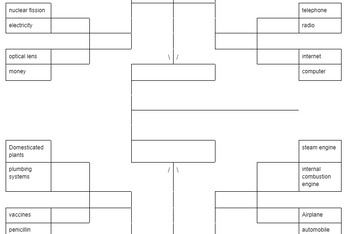3 week - Human Innovation Bracket activity (presentation and group discussion)
- Google Drive™ folder

Description
Students will be assigned a human innovation that they will research and prepare a short persuasive presentation where they are to attempt to convince their peers that the Human Innovation they were assigned deserves the title of greatest human innovation of all time. As the class moves into the bracket they must work with others to expand their research and improve both their arguments and presentation methods.
The final round shifts to a face-off between two halves of the class where each team works in subgroups to prepare for an impassioned discussion that is meant to promote one innovation and weaken the other.
The activity and rubric focuses on research, citing sources, cooperation, public speaking, persuasion, critical thinking, and analysis.





